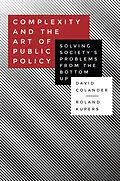How ideas in complexity can be used to develop more effective public policy
Complexity science-made possible by modern analytical and computational advances-is changing the way we think about social systems and social theory. Unfortunately, economists' policy models have not kept up and are stuck in either a market fundamentalist or government control narrative. While these standard narratives are useful in some cases, they are damaging in others, directing thinking away from creative, innovative policy solutions. Complexity and the Art of Public Policy outlines a new, more flexible policy narrative, which envisions society as a complex evolving system that is uncontrollable but can be influenced.
David Colander and Roland Kupers describe how economists and society became locked into the current policy framework, and lay out fresh alternatives for framing policy questions. Offering original solutions to stubborn problems, the complexity narrative builds on broader philosophical traditions, such as those in the work of John Stuart Mill, to suggest initiatives that the authors call "activist laissez-faire" policies. Colander and Kupers develop innovative bottom-up solutions that, through new institutional structures such as for-benefit corporations, channel individuals' social instincts into solving societal problems, making profits a tool for change rather than a goal. They argue that a central role for government in this complexity framework is to foster an ecostructure within which diverse forms of social entrepreneurship can emerge and blossom.
Autorentext
David Colander is professor of economics at Middlebury College and the author of The Making of an Economist, Redux (Princeton). Roland Kupers is an associate fellow in the Smith School of Enterprise and the Environment at the University of Oxford. He is the coauthor of The Essence of Scenarios: Learning from the Shell Experience.
Zusammenfassung
How ideas in complexity can be used to develop more effective public policyComplexity science-made possible by modern analytical and computational advances-is changing the way we think about social systems and social theory. Unfortunately, economists' policy models have not kept up and are stuck in either a market fundamentalist or government control narrative. While these standard narratives are useful in some cases, they are damaging in others, directing thinking away from creative, innovative policy solutions. Complexity and the Art of Public Policy outlines a new, more flexible policy narrative, which envisions society as a complex evolving system that is uncontrollable but can be influenced.David Colander and Roland Kupers describe how economists and society became locked into the current policy framework, and lay out fresh alternatives for framing policy questions. Offering original solutions to stubborn problems, the complexity narrative builds on broader philosophical traditions, such as those in the work of John Stuart Mill, to suggest initiatives that the authors call "e;activist laissez-faire"e; policies. Colander and Kupers develop innovative bottom-up solutions that, through new institutional structures such as for-benefit corporations, channel individuals' social instincts into solving societal problems, making profits a tool for change rather than a goal. They argue that a central role for government in this complexity framework is to foster an ecostructure within which diverse forms of social entrepreneurship can emerge and blossom.
Inhalt
Acknowledgments vii
PART I. THE COMPLEXITY FRAME FOR POLICY
Chapter 1. Twin Peaks 3
Chapter 2. Government With, Not Versus, the Market 19
Chapter 3. I Pencil Revisited: Beyond Market Fundamentalism 31
Chapter 4. The Complexity Policy Frame 44
PART II. EXPLORING THE FOUNDATIONS
Chapter 5. How Economics Lost the Complexity Vision 67
Chapter 6. How Macroeconomics Lost the Complexity Vision 89
Chapter 7. Complexity: A New Kind of Science? 109
Chapter 8: A New Kind of Complexity Economics? 131
Chapter 9. Nudging toward a Complexity Policy Frame 156
PART III. LAISSEZ-FAIRE ACTIVISM IN PRACTICE
Chapter 10. The Economics of Influence 179
Chapter 11. Implementing Influence Policy 195
Chapter 12. Laissez-Faire Activism 214
Chapter 13. Getting the Ecostructure of Government Right 237
PART IV. THE LOST AGENDA
Chapter 14. Getting the Ecostructure of Social Science Education Right 259
Chapter 15. The Lost Agenda 270
Notes 281
Bibliography 291
Index 301
